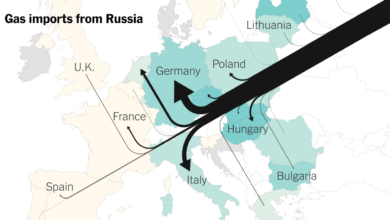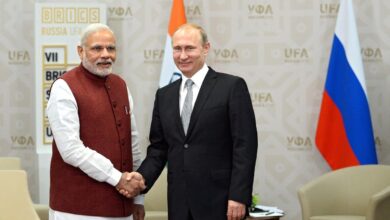How Strong Is the China-Russia Relationship?
How strong is the china russia relationship – How strong is the China-Russia relationship? That’s a question buzzing around global political circles, and for good reason. The two nations, once wary rivals, have forged a surprisingly deep partnership in recent decades, driven by shared interests and a growing desire to challenge the established global order. This complex relationship, however, isn’t without its nuances and potential pitfalls, making it a fascinating case study in international relations.
From their historical interactions, marked by periods of both cooperation and conflict, to their current economic interdependence and burgeoning military cooperation, the China-Russia dynamic is constantly evolving. Understanding the intricacies of this relationship is crucial for anyone trying to make sense of the 21st-century geopolitical landscape. We’ll delve into the historical context, explore their current alignment, examine their economic ties, analyze their security cooperation, and discuss the potential challenges and global impacts of this increasingly significant partnership.
Historical Overview of China-Russia Relations
The post-Cold War relationship between China and Russia has been a complex tapestry woven with threads of cooperation and competition, shaped by evolving geopolitical landscapes and shared interests. While initially marked by a period of cautious rapprochement, the partnership has deepened significantly over the past three decades, driven by mutual strategic concerns and economic opportunities.
Post-Cold War Rapprochement and Initial Cooperation
The collapse of the Soviet Union in 1991 presented both challenges and opportunities for China and the newly independent states of the former USSR. Initially, relations were characterized by a gradual process of rebuilding trust, following decades of ideological conflict and border disputes. Both nations sought to stabilize their respective regions and establish a more predictable international environment.
This period saw the establishment of key bilateral agreements focusing on trade, economic cooperation, and border demarcation. The shared desire for a multipolar world order, less dominated by the United States, also fostered cooperation.
Periods of Cooperation and Tension
Throughout the 1990s and 2000s, the China-Russia relationship experienced fluctuating levels of cooperation and tension. While economic ties steadily strengthened, underlying geopolitical rivalries and differing national interests occasionally surfaced. Competition for influence in Central Asia, for instance, presented occasional friction points. However, shared concerns regarding Western influence and the desire for a more equitable global order consistently outweighed these disagreements, leading to a strengthening of strategic partnership.
The early 2000s witnessed a significant acceleration in bilateral cooperation, particularly in energy, military, and technological fields.
Evolution of Economic Ties
The economic relationship between China and Russia has undergone a dramatic transformation since 1991. Early cooperation focused primarily on trade in raw materials and manufactured goods. However, the relationship has evolved into a far more comprehensive and multifaceted partnership. Significant energy deals, including major gas pipeline projects, have become cornerstones of this economic relationship. Furthermore, increased investment flows in both directions and joint ventures in various sectors have significantly strengthened the economic interdependence between the two nations.
The creation of the Shanghai Cooperation Organisation (SCO) further facilitated economic cooperation and integration within the region.
Key Agreements and Treaties (1991-Present)
| Date | Agreement/Treaty | Key Provisions | Significance |
|---|---|---|---|
| 1991 | Treaty on Good-Neighborly Relations and Friendly Cooperation | Established a framework for bilateral relations; addressed border issues. | Foundation for post-Cold War relations. |
| 2001 | Treaty of Friendship and Cooperation | Strengthened strategic partnership; committed to mutual support. | Marked a new era of deeper cooperation. |
| 2014 | Energy Cooperation Agreement | Covered oil and gas supplies, pipeline projects, etc. | Significantly expanded energy interdependence. |
| 2022 | Declaration on Deepening Comprehensive Partnership and Strategic Interaction | Reaffirmed commitment to a multipolar world order; expanded cooperation in various fields. | Showcased strengthened ties amidst geopolitical tensions. |
Impact on Global Geopolitics: How Strong Is The China Russia Relationship
The burgeoning relationship between China and Russia significantly reshapes the global geopolitical landscape, challenging established power structures and influencing international relations in profound ways. Their growing cooperation, driven by shared strategic interests and a perceived need to counter Western influence, creates a powerful bloc capable of altering the balance of power in Asia and beyond. This partnership’s implications are far-reaching, impacting everything from trade and economic stability to regional conflicts and the effectiveness of international organizations.The deepening China-Russia partnership fundamentally alters the balance of power, particularly in Asia.
The combined economic might of these two nations, coupled with their expanding military cooperation, presents a significant challenge to the United States and its allies. This shift necessitates a reassessment of existing alliances and strategies by other global players. The potential for joint military exercises, technological collaborations, and coordinated diplomatic initiatives creates a complex and evolving geopolitical dynamic.
Shift in Asian Power Dynamics
The strengthening China-Russia alliance directly impacts the balance of power in Asia. China’s economic dominance and Russia’s military capabilities create a formidable partnership that challenges the existing regional order. This has led to increased tensions with countries like Japan, South Korea, and several Southeast Asian nations who are now forced to recalibrate their foreign policies to account for this new reality.
For example, the increased military activity in the South China Sea and the Russian military presence in the Far East have created a more complex security environment, prompting regional countries to strengthen their own defense capabilities and seek closer ties with other external powers.
Implications for International Organizations, How strong is the china russia relationship
The China-Russia partnership poses significant challenges to the effectiveness of multilateral institutions like the United Nations and the World Trade Organization. Their often-divergent views on issues like human rights, international law, and global governance can lead to gridlock and impede the ability of these organizations to address pressing global issues. For instance, their frequent use of veto power in the UN Security Council reflects their growing determination to shape global decision-making in ways that align with their interests, potentially undermining the authority and influence of these international bodies.
Influence on Global Economic Order
The economic implications of the China-Russia partnership are substantial. Their growing trade ties, joint infrastructure projects, and efforts to create alternative financial systems (such as circumventing the US dollar) are reshaping global trade relations. This challenges the existing US-dominated economic order and presents both opportunities and risks for other countries. For example, the Belt and Road Initiative, coupled with Russian investments in Eurasian infrastructure, creates new economic corridors and trade routes, potentially diverting trade flows away from traditional Western-centric systems.
This shift in economic influence has the potential to create both winners and losers amongst participating and non-participating nations.
Regional Impacts
The impact of the China-Russia relationship varies across different regions:
- Central Asia: Increased Russian and Chinese influence in the region, potentially leading to reduced Western influence and a greater dependence on these two powers for economic and security cooperation. This may lead to increased competition for resources and strategic advantages in the region.
- Europe: Increased pressure on European countries to choose sides between the West and the growing China-Russia bloc. This presents a significant challenge to the EU’s efforts to maintain its strategic autonomy and to navigate its relationship with both powers. The potential for increased energy dependence on Russia and economic ties with China adds further complexity to the European geopolitical landscape.
- Arctic Region: Joint exploration and development of Arctic resources and increased military presence in the region. This raises concerns about environmental protection and potential for conflict amongst stakeholders, particularly as climate change opens up previously inaccessible areas.
The China-Russia relationship is a powerful force shaping global geopolitics. While undeniably strong in many aspects, it’s far from a monolithic bloc. Competing interests and potential future challenges remain, but the current level of cooperation is undeniable and carries significant weight on the world stage. Whether this partnership continues to deepen or encounters unforeseen strains will be a key factor in determining the future trajectory of international relations.
It’s a story that’s far from over, and one worth continuing to watch closely.
The China-Russia relationship is a complex one, constantly shifting based on mutual interests and global dynamics. It’s fascinating to see how these geopolitical shifts impact domestic US politics, like the recent spat where GOP Gov. Sununu called Biden and Garland morons over the Mar-a-Lago raid , a distraction perhaps from larger international concerns. Ultimately, the strength of the China-Russia bond remains a key factor influencing the global landscape.
The China-Russia relationship is a complex beast, a strategic partnership built on shared interests and mutual benefit. It’s fascinating to consider how global dynamics influence even domestic US politics; check out this article on whether Kamala Harris could sway Florida for the Democrats, could the Kamala Harris boost put Florida in play for democrats , because the strength of the Sino-Russian alliance definitely impacts the global chessboard and thus, indirectly, US election strategies.
So, how strong *is* the China-Russia relationship, really? It’s a complex question, and honestly, the whole geopolitical landscape feels pretty chaotic right now. It makes me think of the domestic drama, like when Trump called the DOJ’s special counsel appointment a horrendous abuse of power, as reported here: trump calls dojs special counsel appointment a horrendous abuse of power.
That kind of political infighting certainly overshadows other global issues, but ultimately, the strength of the China-Russia bond probably depends more on shared interests than on any specific US political event.




